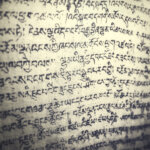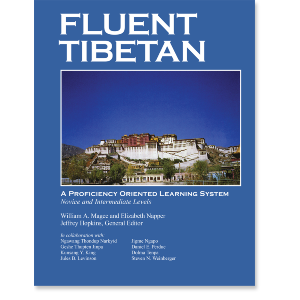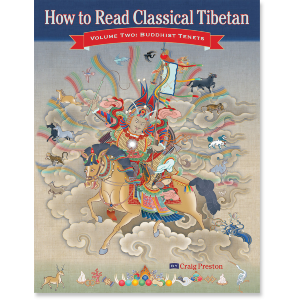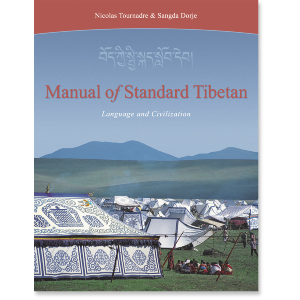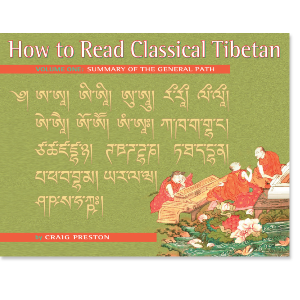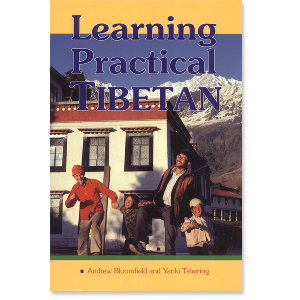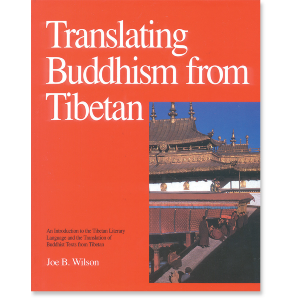
The modern Tibetan language derives from the 7th-9th century Old Tibetan and is spoken by 6 million people in the world with over 200 dialects. Primarily spoken in the Tibetan Plateau, Nepal, India, and Bhutan, the Tibetan language is represented in a range of Buddhist culture, literature, philosophical works, and liturgy, the most notable being the Tibetan Buddhist canon, or collection of Buddhist texts ranging from sutra (words of the Buddha) and shastra (commentaries, treatises, and so forth), both from the Mahayana and Early Buddhist traditions.
Generally speaking, Tibetan is broken up into two categories: Classical Literary and Colloquial Tibetan, both of which have their own set of grammatical rules. Classical Tibetan refers specifically to canonical and liturgical texts, but can be found in modern Tibetan writing as well. Colloquial Tibetan refers to everyday language including the wide range of dialects found among Tibetan communities.
As interest in Tibetan Buddhism and the Buddhist canon has grown significantly throughout the past few decades, today it is possible to study Tibetan language (both Classical and Colloquial) through several different programs around the world. The following guide represents some of the programs available for Tibetan language study today.
You will also find a selection of Tibetan Language texts published here at Shambhala at the bottom of the page.
Study Abroad Programs
School for International Training (SIT)
SIT offers an in depth study abroad training in Tibetan and Himalayan society, religion, art, and history along with language study in Tibetan or Nepali. They offer courses for university credit in the Fall and Spring academic year. For more information see studyabroad.sit.edu

Rangjung Yeshe Institute (RYI)
RYI is an institute of higher learning connected with Kathmandu University and founded by Chokyi Nyima Rinpoche. RYI offers courses in Tibetan language, Sanskrit, and Nepali along with a mix of traditional and modern education in Buddhist philosophy, history, and culture. The offer several degree programs from the BA to the PhD level as well as summer intensives, certificate courses, and a year-long translator training program. Learn more at ryi.org
The College for Higher Tibetan Studies (CHTS)
CHTS located in Sarah village, Dharmshala offers training in Tibetan language, Buddhist Philosophy, and teacher training to international students from around the world. The language courses are 10 months long (July-April) and range from beginner to pre-intermediate to intermediate level language studies.
They also have an exchange program through Earlham College and Emory University as well as a summer intensive for young Tibetans who were born or brought up in the west to learn about the experience, culture, and history of Tibet and the Tibetan exile community.
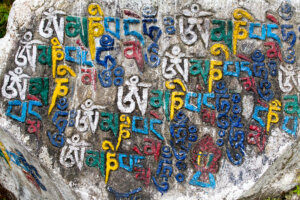
Online or Hybrid Learning
Esukia
Esukia helps bring Tibetan language learners together with native Tibetan speakers for 1:1 conversation based learning. All of their material is open source and their several teachers to work with students at different levels and language learning capacities.
Individual classes take place online, so you can study Tibetan from anywhere there's internet connection. Or there is the option of immersion style learning in Dharmsala. To learn more see esukhia.net

Lotsawa Rinchen Zangpo Translator Program (LRZTP)
LRZTP specializes in training translators in the skills required to work as a translator or interpreter in Buddhist Dharma centers or as free-lance Tibetan translators. Program options include a two-year language and interpretation training program and intensive short courses as well as online private lessons. To learn more visit www.lrztp.org.
LopLao (Easy Tibetan)
LopLao offers a variety of online and in person learning programs to suit the needs of various Tibetan language learners. Founded by Tenzin Choephel and Dr. Rachel Griffiths, LopLao was established to "promote and advance Tibetan language and culture worldwide." To learn more check out https://www.easytibetan.org/
Saranath International Nyingma Institute
SINI is a non-profit institute founded by Tarthang Tulku Rinpoche and offers a range of programs including Classical and Colloquial Tibetan language. To learn more visit sinibridge.org.
Mangalam Research Center
MRC offers online language courses in both Sanskrit and Tibetan. MRC introduces language learners to foundational linguistic theory, grammar, and vocabulary through chanting and reading simple Buddhist texts as well as training in reading a range of genres. To learn more go to mangalamresearch.org.
Tibetan Language Institute
TLI is an educational non-profit founded by David Curtis. TLI is aimed at helping students discover the joy in learning to Classical Tibetan through an organized system of study. Language learners can study at their own pace or through private lessons with David. To learn more visit tibetanlanguage.org.
University Courses, Degree Programs and Summer Intensives
North American Universities
University of Wisconsin-Madison
The University of Wisconsin offers a BA in Asian Language and Cultures including a deep study of the Tibetan language, culture, and history. They also have a summer intensives in Tibetan and Sanskrit through their South Asia Summer Language Institute. To learn more visit their website.
University of Chicago
The University of Chicago offers Tibetan classes at all levels, every year, in addition to having a world-class doctoral program in Buddhist Studies (two surveys by Chuck Prebish, published in JIABS, ranked them #1). They have also recently begun an online course-share program with Northwestern University.
University of Virginia
UVA has been at the forefront of teaching and research of Tibetan language since the 1970s. Their program includes rigorous training in Classical and Colloquial Tibetan as well as fieldwork, immersive language training, and deep inquiry into primary texts. For more information check out the UVA Tibet Center.
Maitripa College
Maitripa College is a higher learning institute for Buddhist Studies in Portland, OR. The offer an MA in Buddhist Studies which includes a Tibetan Language Track and continuing education for non-degree seeking students. In addition they provide an 8-week summer intensive course in Tibetan language geared at training students how to pronounce and read Tibetan sentences.
University of British Columbia
UBC offers summer language intensives in Nepali, Tibetan, and Sanskrit which is open to both degree seeking students and non-UBC students. This program is offered through the Department of Asian Studies which itself provides training the study of Asian culture, thought, religion, and language. To learn more visit their website.
Columbia University
Columbia University's Department of East Asian Language & Cultures offers language courses in Classical and Colloquial Tibetan as part of their BA and MA programs. Courses range from beginner to advanced language study leading to great proficiency in both spoken and literary Tibetan. Check out their website to learn more.
Yale University
Yale University provides training in Classical Tibetan from beginner to advanced for university students. Courses range from a basic introduction to grammar to reading a variety of primary texts from a range of genres. Learn more here.
Indiana University - Bloomington
Indiana University's Central Eurasian Studies provides students with classes in Tibetan language with two or three years of language study available for their undergraduate program. Learn more here.
European Universities
University of Hamburg
The University of Hamburg offers a 2 year International Master's Program in Tibetan Studies. The objective of their MA program is to "is to further train students to independently and critically investigate any given theme dealing with various aspects of the Tibetan culture transmitted primarily in the form of written texts." For more information see their website.

University of Vienna
The University of Vienna offers a BA in Languages and Cultures of South Asia and Tibet. The program offers training in Classical and Colloquial Tibetan along with studies in Sanskrit, Old Indic, Prakrit, Hindi, and Nepali. Check out their website for details.
University of Heidelberg
The University of Heidelberg Centre for Transcultural Studies offers courses in Tibetan language as part of their MA in Transcultural Studies. Students can choose to focus on Buddhist studies and take courses in both Classical and Colloquial Tibetan as part of their coursework. Visit their website to learn more.
University of Leipzig
The University of Leipzig's Institute for South and Central Asian Studies offers training and research in Tibetan, Sanskrit, Hindi, and Mongolian as part of their BA and MA degrees in Indology, Tibetology, and Mongolian Studies. Check out their website to learn more.
University of Leiden
The University of Leiden's South Asian & Tibetan Studies provides students with the opportunities study Classical Tibetan, Sanskrit, Indonesian, and Hindi as well as opportunity to study abroad and undergo immersive training in their chosen area of study. Check out their website to learn more.
Inalco (Institut National des Langues et Civilisations Orientales)
Inalco offers a full BA in Tibetan language and civilization, an MA degree in Tibetan as well as other undergraduate diplomas ("diplômes d'établissement") in Tibetan language and civilization. See:
http://www.inalco.fr/langue/tibetain
http://www.inalco.fr/formations/departements-filieres-sections/asie-sud-himalaya/formations
Online Language Learning Resources
Mangalam Research Center
The vision of Mangalam Research Center for Buddhist Languages is to create a body of knowledge that facilitates the translation and transmission of the Buddhist written tradition and classical languages into English.
Mangalam Research Center offers programs in Buddhist studies and develops tools to aid translation. Its programs have been attended by scholars from around the world, and it often receives grants in support of its conferences and translation projects.
Recommended Recordings and Resources from Mangalam Research Center
- Tools for the Budding Lotsawa: A Hands-on Introduction to Resources for the Interpretation and translation of Tibetan Buddhist Texts with Prof. James Gentry
- See the accompanying resource list compiled by James Gentry here.


